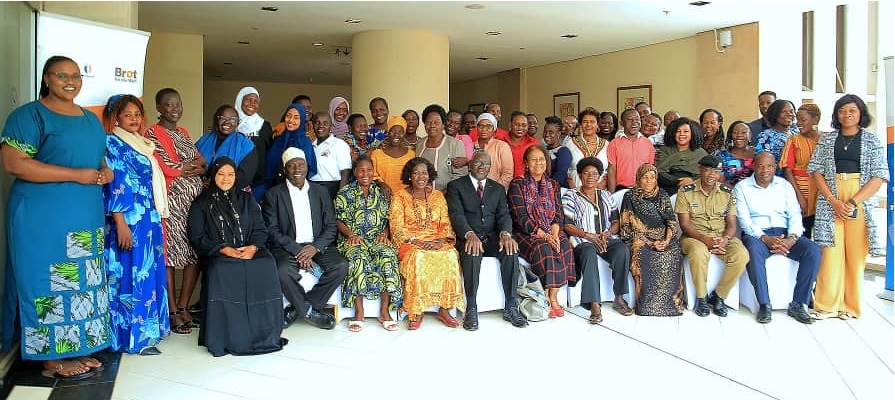Women market vendors (WMVs) sustain households, feed communities, and power local economies, often as primary breadwinners and caregivers. Yet, the spaces that depend on their labour remain perilous and poorly governed.
Across nine (9) markets in Arua City, the Strategic Initiative for Women in the Horn of Africa (SIHA) Network’s recent research report reveals a stark contradiction: workplaces intended to support livelihoods are instead sites of risk, exclusion, and neglect.
The Findings
- Violence and harassment are widespread. 62% of WMVs reported experiencing physical or psychological harassment at work; 17.8% faced sexually suggestive gestures; and 11.8% received sexually explicit comments. Only 9% reported these incidents; most viewed reporting as futile, feared reprisals, or distrusted authorities.
- Economic contribution, minimal protection. While WMVs shoulder unpaid care alongside vending, markets lack even basic protections. 88% of vendors lack protective stalls, sanitation facilities are inadequate, and waste is often left openly in markets, threatening health and safety.
- Infrastructure and governance gaps. Many markets lack drainage, accessible toilets, storage, and security. Inspections are irregular and weakly enforced. Vendors living with disabilities are largely excluded, with only Arua-main having accessibility structures.
- Financial exclusion blocks resilience. WMVs face high-cost credit, limited literacy, and bureaucratic barriers to public schemes. Uptake is low and dissatisfaction high, leaving women reliant on informal credit and vulnerable to exploitation.
- Leadership exists but trust is low. Women serve on market committees, yet weak conflict resolution, opaque mandates, and lack of accountability erode vendors’ confidence in these structures.
“No woman should live in dread whether walking the streets or simply trying to work to support her family. Meet them halfway, with social and economic protection, as well as access to justice.” — Hala Alkarib, Regional Director SIHA Network
Recommendations
Local Government (Arua City Council & Divisions)
- Make markets safe: Upgrade infrastructure such as drainage, lighting, stalls, toilets, handwashing, and waste systems; with ring-fenced maintenance budgets and published schedules.
- Provide survivor redress: Establish reporting desks with trained focal persons, referral pathways to health, psychosocial and legal aid, and sanctions under by-laws. Display reporting information in local languages.
- Strengthen inspections: Conduct monthly joint inspections across health, engineering, environment, and policing, with published compliance results.
- Inclusive governance: Guarantee WMV representation, including persons with disabilities, on committees. Adopt transparent stall allocation and provide training for women leaders.
- Expand financial access: Run financial literacy clinics in markets, promote low-cost savings/loan products, and align repayment calendars with seasonal incomes.
National Government (Ministry of Gender, Labour and Social Development, Ministry of Local Government, Ministry of Health, Ministry of Justice and Constitutional Affairs and the Uganda Police Force)
- Enforce existing laws: Apply the Employment Act, National Gender Policy, Markets Act (2023), and the Gender-Based Violence Action Plan in informal markets. Clarify police and inspector roles and track cases.
- Legal aid: Fund legal-aid clinics in markets and waive fees for protection orders and case filings related to market-based violence.
- Health access: Provide reproductive, maternal, and primary care in markets. Integrate GBV clinical services in nearby facilities and fast-track referrals.
- Finance reform: Simplify access to public financing schemes such as the Parish Development Model (PDM), the Presidential Initiative on Wealth and Job Creation (commonly known as Emyooga) and the Women Entrepreneurship Program (WEP) through clear criteria, grievance channels, and gender-responsive loans (collateral-free microloans, flexible repayment). Also, publish disbursements by sex and sector.
- Guarantee accessibility: Require ramps, accessible toilets, and designated stalls for persons with disabilities in all new and renovated markets and allocate funds to retrofit existing ones.
International Community (Donors, INGOs, UN Agencies, DFIs)
- Direct support: Provide funding to WMV cooperatives, savings groups, and associations for core costs and safeguarding, alongside governance and conflict resolution training.
- Finance upgrades: Invest in market infrastructure that prioritizes WMV safety; lighting, sanitation, storage, and accessibility; with sustainable maintenance plans and gender outcomes.
- Fair credit: Establish guarantees to expand access to recourse loans and working capital for WMVs at fair rates through regulated microfinance institutions, with safeguards against over-indebtedness.
- Accountability and data: Support independent monitoring of safety, GBV response, and financial disbursements through open-data dashboards and community scorecards co-designed with WMVs.
“As a woman market vendor, I have been able to feed my family, pay school fees, and even support one of my children to pursue a PhD. With the right support from organizations like SIHA Network and through trainings in topics like leadership and advocacy, I now serve as City Speaker of Arua City. My story is proof of the potential within women market vendors. We are not only sustaining families and driving local economies; with the right investment, we can become leaders and decision-makers. I therefore call on government, local authorities, and the international community to stand with women market vendors – support us, protect us, and invest in us, because when we thrive, our families, our communities, and our country thrive as well.” — Hon. Gloria Teddy Yako, City speaker Arua
To read the full report, click here
Note: This statement was presented during a Regional Learning Exchange held in Kampala, Uganda, on 21–22 August 2025. Organized by SIHA Network with support from Bread for the World | Brot für die Welt, the event brought together over 50 participants from Ethiopia, Somalia, South Sudan, Sudan, and Uganda, including women market and street vendors, policymakers, and representatives from WROs across the Greater Horn of Africa region.

